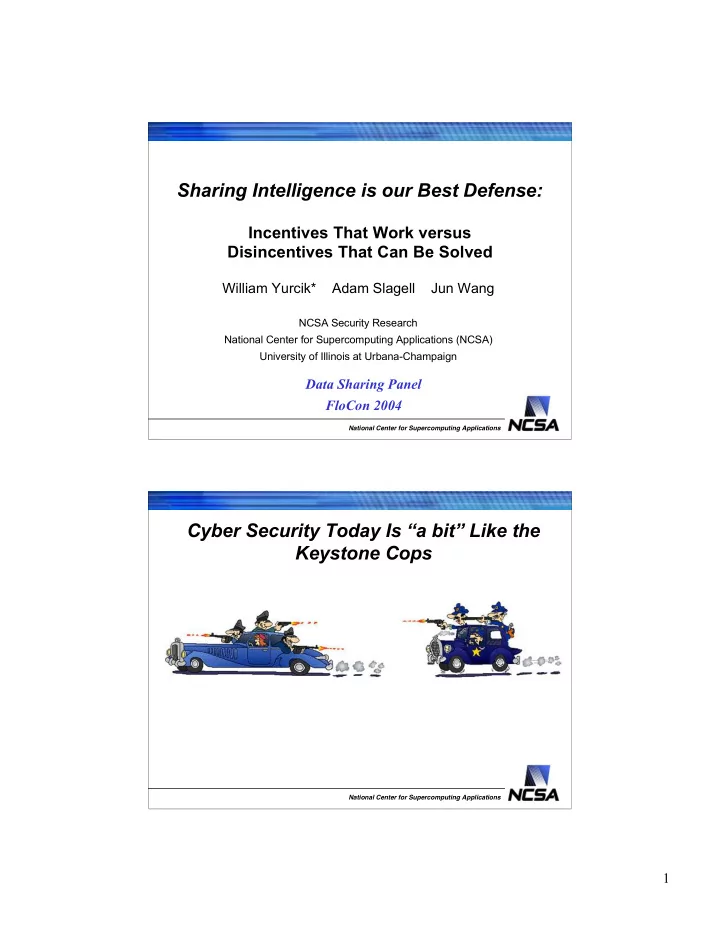

Sharing Intelligence is our Best Defense: Incentives That Work versus Disincentives That Can Be Solved William Yurcik* Adam Slagell Jun Wang NCSA Security Research National Center for Supercomputing Applications (NCSA) University of Illinois at Urbana-Champaign Data Sharing Panel FloCon 2004 National Center for Supercomputing Applications Cyber Security Today Is “a bit” Like the Keystone Cops National Center for Supercomputing Applications 1
Cyber Security Today Is “a bit” Like the Keystone Cops They do something really bad! National Center for Supercomputing Applications Cyber Security Today Is “a bit” Like the Keystone Cops They do Then we chase something them to the really bad! border. National Center for Supercomputing Applications 2
Security Information Sharing Need to share information on attacks. • – Fingerprints and attack profiles – Individual events Identify individuals • We cannot continue to stop at the border, we need to • cooperate with law enforcement and each other. – Security event repository – Event correlation across administrative domains “unfortunately, this country takes body bags and • requires body bags sometimes to make really tough decisions about money and about governmental arrangements” - Richard Clarke 9/11 Testimony National Center for Supercomputing Applications The World is Rapidly Changing Greater Dependency on Collaborations and Technology National Center for Supercomputing Applications 3
Cooperation is Voluntary The vast majority of incidents are never reported National Center for Supercomputing Applications Cooperation is Voluntary Caveat - except in California! Only state mandatory disclosure law currently on the books at state level. Effective as of July 2003 National Center for Supercomputing Applications 4
Cooperation is Voluntary Caveat - except in California! Only state mandatory disclosure law currently on the books at state level. Effective as of July 2003 California Law has national effects : California is home to many of the biggest technology companies in the country. Law applies to all who “conduct business” in the state. Of course many companies route their information through servers housed in California. Potential for litigation in California - many times companies will have no way of knowing whether a person is resident of California or not. National Center for Supercomputing Applications Computer Emergency Response Teams CERTs http://www.first.org/team-info/ National Center for Supercomputing Applications 5
Information Sharing and Analysis (ISACs) • Gathering, analysis • Operational ISACs and sharing of – Electric power – Telecommunications information related – Information technology to actual or – Financial services unsuccessful – Water supply attempts at computer – Surface transportation security breeches. – Oil & gas • Presidential Decision – Emergency fire services Directive (PDD)-63 – Food – Chemicals industry • Fee base – Emergency law membership enforcement National Center for Supercomputing Applications Question: Question: Can we share? Can we share? National Center for Supercomputing Applications 6
(1) SANS National Center for Supercomputing Applications (2) DShield.org Distributed Intrusion Detection System Services registered for this port Vulnerabilities for this port …. … National Center for Supercomputing Applications 7
<http://www.first.org/> (3) Forum of Incident Response and Security Teams (4) CIC-SWG Committee on Institutional Cooperation - IT Security Working Group (Big Ten Universities plus the University of Chicago) <http://www.cic.uiuc.edu/groups/ITSecurityWorkingGroup/> National Center for Supercomputing Applications Incentives Incentives / / Disincentives Disincentives National Center for Supercomputing Applications 8
Framing the Data Sharing Issues Both an Internal / External Issue (within before between) • Who should share externally? • – at what organizational levels (more/less bureaucracy) – flat or hierarchical (scalability) What should be shared? • – raw data, processed data, known answers How should it be shared? • – phone calls/Emails, reports, automation Significant time and effort to share – payback? none/long-term real-time Does technology exist to share securely – Will information I share come back to bite me? National Center for Supercomputing Applications Commonly Available Logs 12) Vulnerability Scan Logs 1) NetFlows Logs 13) Nameserver DNS Cache 2) Packet Traces - tcpdump 14) SNMP Logs 3) Network IDS- BRO,Snort, etc. 15) BGP Tables 4) Host IDS – Tripwire, etc. 16) Dial-Up Server Logs 5) Syslogs (general) 17) ARP Cache 6) Authentication Logs 18) Workstation Logs 7) DHCP Server Logs 19) Process Accounting Logs 8) Firewall logs 20) Trace Route Logs 9) Mail Server Logs 21) “Homegrown” Logs 10) Backup Logs ….. 11) AntiVirus Logs National Center for Supercomputing Applications 9
Attributes Across Logs National Center for Supercomputing Applications Log Anonymization Log Multiple Anonymizing Levels of Requirements Engine Anonymized Logs (e.g., different internal/external requirements) Algorithms National Center for Supercomputing Applications 10
Known Statistical Plain-Text Inference Attacks Anonymized Anonymized Prefix-Preserving Prefix-Preserving IDS Log Syslog Log unique scan of IP X at time T 1 unique ssh attempt on IP X at time T 1 IP X with port activity at Time T 2 IP X unique syslog messages at time T 2 National Center for Supercomputing Applications National Center for Supercomputing Applications 11
NCSA SIFT Project NCSA SIFT Project http://www.ncassr.org/projects/sift/ http://www.ncassr.org/projects/sift/ VizSEC VizSEC Workshop Oct 29, 2004 Workshop Oct 29, 2004 ACM Computer and Communications ACM Computer and Communications Security Washington DC Security Washington DC http://www. http://www.cs cs.fit. .fit.edu edu/~ /~pkc pkc/vizdmsec04/ /vizdmsec04/ National Center for Supercomputing Applications Discussion No one-size-fits-all solution exists for log sharing • Solutions depend on the application • three major problems – 1) huge distributed data volumes • visualization is part of the solution here – next workshop 2) security must be considered • CIA • may require re-design/re-architecture (I hope not!) 3) Incentives Operational incentives may be the key • We have a counter-intuitive example that actually works: – sharing between very selfish sysadmins with very sensitive security • information (go figure) “only cooperation will make us less vulnerable” – National Center for Supercomputing Applications 12
Recommend
More recommend